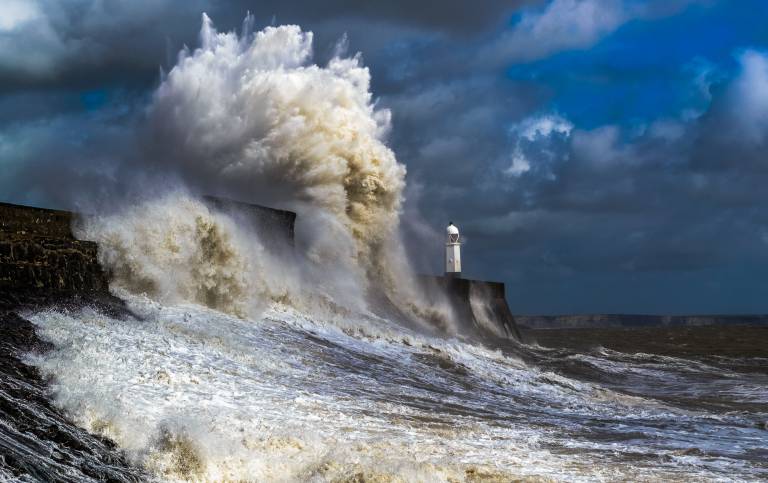UCL partners with Met Office to advance science of weather and climate prediction
4 October 2022
UCL academics’ expertise in environmental hazards, machine learning and research computing will help build resilience to high-impact weather events and climate change through a deeper partnership with the Met Office.

A select group of leading UK universities including UCL have been selected for the Met Office Academic Partnership (MOAP), aiming to better understand the increasing impacts of extreme weather and climate change and how these affect society.
Through the partnership, UCL will build on existing projects with the Met Office by bringing together an interdisciplinary team of researchers from 12 UCL departments and centres, including the recently established Advanced Research Computing Centre, to transform hazard and data science in weather and climate modelling to help tackle global issues.
UCL’s contribution will focus on three main areas:
- improving risk-based decision making by increasing our understanding of the impacts of environmental hazards
- using artificial intelligence (AI) and machine learning to remain at the cutting edge of weather and climate prediction
- developing a federated cloud data platform for use by the Met Office and partner scientists and experts.
The UCL team spans a wide range of disciplines, including environmental sciences, risk and technology studies, engineering, psychology, architecture, space science, computer science, mathematics and statistics, as well as research computing. It is being led by the Joint Chair, Professor Serge Guillas (UCL Statistical Science, and Associate Director of UCL’s Advanced Research Computing Centre).
Professor Guillas said: “Universities have strengths and special expertise that the Met Office can tap into when developing more precise models, or when giving answers to government by linking the science of climate and weather to the impact on people and infrastructure. It is very timely to quantify the possibility of climate driven disasters and decide how we can take action.
“For UCL this partnership gives us new routes to impact, and access to the Met Office’s knowledge, data, computational modelling expertise, and facilities.”
UCL is a global leader in AI, data science, and advanced computing. The institutional AI Strategy – “AI for people and planet" – seeks to position AI as a force for good in the world leveraging the university’s combined research strengths in fundamental AI, applications of AI, as well as responsible AI.
Areas of collaboration might include improving real-time predictions of the weather, quantifying uncertainty in future climate predictions, mimicking how a home would suffer under climate change, predicting how people will react to extreme weather warnings and what impact these could have on those who are vulnerable or displaced.
UCL Vice-Provost Research, Innovation & Global Engagement, Professor Geraint Rees, said: “Tackling the effects of climate change is one of the most important global challenges, so UCL is proud to partner with the world-leading expertise of the Met Office.
"Our expertise in data science and AI, hazard and risk, observations, cloud data management, and high-performance computing complements the Met Office’s unique scientific and computational capabilities to create a step-change in our national ability to tackle these challenges.”
Other universities selected as MOAP partners are Birmingham, Bristol, Edinburgh, Exeter, Leeds, Oxford, and Reading.
Professor Stephen Belcher, the Met Office’s Chief Scientist, added: “Extreme weather events and climate change pose among the greatest risks facing humanity. Tackling them is an urgent and huge undertaking. The Met Office can’t do it alone – the Met Office Academic Partnership harnesses the best of UK research and will give us the best chance of coping with and adapting to future change.”
Source
Press release from the Met Office, the national meteorological service for the UK
Links
- Professor Serge Guillas’ academic profile
- UCL Department of Statistical Science
- UCL Faculty of Mathematical & Physical Sciences
- UCL Research, Innovation & Global Engagement
- UCL partners with the Met Office on weather and climate science
- AI for People and Planet
Image
A wave breaks in a storm near a lighthouse in Porthcawl, Wales. Image credit: iStock / Dwryan
Media contact
Sophie Vinter
Tel: +44 (0)20 3108 7787
Email: s.vinter [at] ucl.ac.uk
 Close
Close

